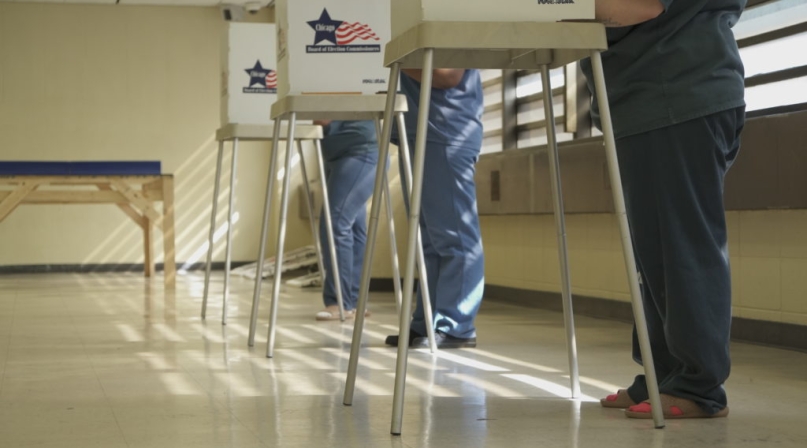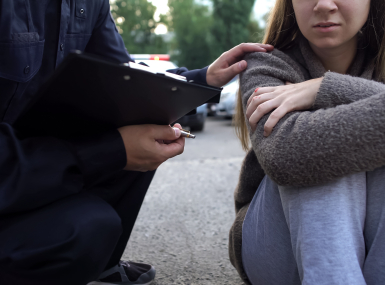Counties try to ensure all who are eligible can vote
Upcoming Events
Related News

Key Takeaways
Counties are ensuring that all eligible voters, particularly community members currently in jail or formerly incarcerated, can vote.
Nearly all people detained in county jails – 658,000 – are eligible to vote, but many don’t because of obstacles with registration deadlines, voting processes, lack of access to educational resources and confusion about eligibility. These challenges are exacerbated for people with felony convictions who lose their right to vote at least while incarcerated and potentially indefinitely, except in Maine, Vermont and the District of Columbia.
Counties are educating residents who are in jail of their voting eligibility and increasing access to voting registration and polling. These efforts are often spurred by and developed in tandem with local advocates, volunteers and community-led organizations. Furthermore, sheriffs and election officials, each playing key roles, can benefit from collaborating to uphold and facilitate the voting process for eligible community members. Unlocking the vote is not only a fundamental pillar of our democracy but can help reduce recidivism, contribute to a sense of community and enhance prosocial behavior.
Enhancing educational resources and outreach
One of the biggest barriers is that many residents who are impacted by the criminal legal system often don’t realize they are eligible to register and vote. Not only is education critical for people who are justice system involved, but it’s also critical for county leaders and staff, so they can provide correct and accurate information.
In Yolo County, Calif., the county elections office, public defender’s office and probation department are reminding all residents that they retain the right to vote regardless of any prior convictions. These efforts include holding voter registration drives, providing voter registration cards and sending mailers to individuals in the jail with information about voter eligibility and the voter registration process.
“We not only want people to know about their voting rights; we also want to make voting accessible,” said Emily Kochly, chief mitigation specialist with the public defender’s office. “Access to voting empowers people with lived or direct experience with the criminal legal system and allows them a means of changing the system and their community for the better.”
The Voting Access for All Coalition (VAAC) works with jail and election officials within Michigan’s 83 counties to expand its Vote by Mail in Jail program, assist incarcerated voters to register and request absentee ballots, provide voter educational materials and host Jailed Voter Information Sessions.
VAAC also held a webinar for county clerks to find ways to register eligible people detained in jail. In Genesee County, Mich., the sheriff held a candidates’ forum in jail featuring candidates on the ballot.
After the Washington Legislature funded voter registration and voting within county jails, the Spokane County, Wash. auditor hopes to use the resources for educational videos and posters.
Prior to elections, detention staff ask individuals if they are registered to vote and if they would like to receive a ballot but very few request ballots. The educational material aims to increase turnout and help people learn about their rights.
Increasing ballot access
Corrections and elections officials can make a commitment to ballot access by opening polling places in jail and reducing the barriers to receiving and submitting absentee ballots when in-person polling is not feasible.
In 2020, Cook County, Ill. opened in-person voting at several places in the jail complex.
This opportunity, with same-day registration, contributed to a higher voter turnout in the jail than the city as a whole in the 2022 primary. The Will County, Ill. Detention Center recently opened a polling place for primary and general elections, an option available to all counties after the state enacted legislation in 2021. Los Angeles County, Calif. and Washington, D.C. also offer in-person voting in local jails.
After several years of local advocates hosting registration drives in the jail, Harris County, Texas opened an in-jail polling place in 2021.
The organization developed public service announcements encouraging people detained in jail to vote. Individuals can use jail-issued identification to satisfy voter identification requirements, which can be a barrier.
Attachments
Related News

House passes legislation to increase the Crime Victims Fund
On January 12, the House passed the Crime Victims Fund Stabilization Act (H.R. 909) by a voice vote.

CMS requires state Medicaid suspension upon arrest versus termination
Effective January 1, 2026, federal law now requires states to suspend, rather than terminate, Medicaid coverage when an individual is incarcerated.
